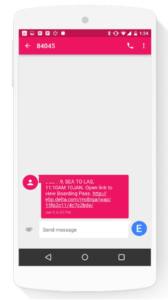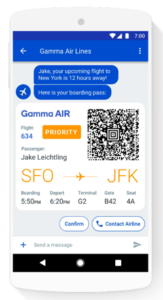Last month, GSMA (Global Spéciale Mobile Association) held their global event, Mobile World Congress, in Barcelona. The GSMA represents over 800 carriers and 300 operators worldwide in mobile. This not only includes the AT&T and Sprints of the world but also hardware, internet providers and more. The goal of Mobile World Congress is to further technology in the mobile space with providers, technology companies and more. The most talked about technology was Google’s big push for RCS. But what is RCS and why should brands care?
RCS stands for Rich Communication Services, it has a few more bells and whistles than your regular text messages. While this technology isn’t new as its existed at a person to person level, the opportunity for application to person is just being developed. This can be compared to messaging apps like WhatsApp, Facebook Messenger and more but now brands are trying to get in on the action that is within the native messaging app on a user’s phone. This means providing a richer experience without the barrier of an app download.
RCS takes text messaging to the next level by allowing brands to customize their messaging like never before. Instead of receiving messages from a short code (5 or 6 digits), brands can customize their sender name, colors and include interactive messaging. Also, read receipts will be available, something not reportable for SMS.
No longer will brands have to worry about keyword interactions as RCS allows preconfigured “chips” to be presented to continue the customer journey. These can also include location-based services. Imagine, getting a message for a coupon for your favorite retailer and seeing a map of the nearest location.
But what are the downfalls? Currently, only one major carrier, Sprint, has announced its support of RCS in the United States. As this is a Google initiated project (competing against iMessage no less), this will only be available on Android devices; specifically, Samsung for the initial public launch in late 2018. Will RCS be a homerun for Google or will it fall to the wayside like Google+?
References:
http://bgr.com/2018/02/23/rcs-vs-sms-googles-android-messages-future/



4 Responses to What’s next in mobile for brands?